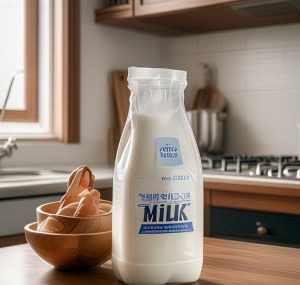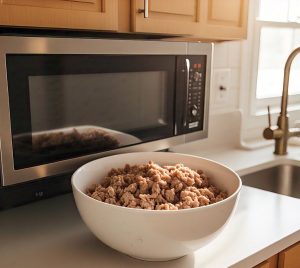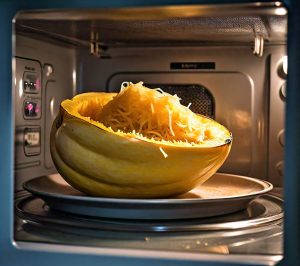Milk is a dairy product produced by mammals that is often consumed as a beverage or used in cooking and baking.
The question arises, can you put milk in the microwave?
This article will delve into the details of microwaving milk, discussing whether it’s safe and feasible to do so. If you’re able to microwave milk, we’ll provide guidance on how long to heat it without impairing its nutritional value and taste. In case microwaving isn’t recommended for milk, we’ll offer alternatives alongside some tips and precautions when dealing with this specific dairy product. The piece will also answer frequently asked questions about microwaving milk, concluding with our final word on the subject.

Jump To:
Can You Put Milk in the Microwave?
Yes, you can put milk in the microwave. However, it’s important to handle this process carefully to prevent overheating or spillage. Unlike other liquids or food items with similar attributes, milk requires specific care when being microwaved due to its sensitive nature and risk of rapid temperature change causing a mess or altering consistency unfavorably. Use medium power settings and set time intervals while heating it. Stir at regular intervals for even distribution of heat – an essential step not only for milk but also necessitated by other similar items like broth or soup.
Facts About Microwaving Milk
Here, we will discuss the important things to note about microwaving milk.
- Heat Distribution: Microwaves heat liquids unevenly which can result in some parts of the milk being scalded while others remain cold.
- Nutrient Preservation: Microwaving does not significantly affect the nutritional content of the milk. However, overheating may lead to a slight loss in vitamin B12.
- Bacterial Growth: Milk should not be left out for too long after microwaving as it creates an environment conducive to bacterial growth. It is advisable to consume immediately after heating.
- Taste and Texture: Overheating can alter the taste and texture of milk making it slightly “cooked” or scorched.
In conclusion, while you can microwave milk, caution must be taken not to overheat and consume immediately post-heating. Continue reading to get more insights on microwaved beverages!
How Long Can You Microwave Milk?
The duration to microwave milk depends on the quantity and the desired temperature. Generally, one cup of milk should be heated for 1-2 minutes on medium power. It’s important to stir every 30 seconds to ensure even heating and prevent skin from forming. Just like other liquids, overheating milk can lead to bubbling over or burning.
Does Heating Milk in a Microwave Destroy its Nutrients?
Microwaving doesn’t significantly destroy the nutrients in milk. Most nutrients are heat stable and aren’t affected by short periods of heating at moderate temperatures in microwaves. However, prolonged exposure might potentially degrade some vitamins such as Vitamin C but this is also true for conventional cooking methods.
Check out if you can heat almond milk in the microwave.
Does Heating Milk in a Microwave Affect the Flavors?
No significant flavor changes occur when you heat milk in a microwave compared with other methods of heating. However, high heat can cause slight changes if it leads to scorching or formation of skin on top resulting from protein denaturation; thus, stirring periodically while avoiding overheating helps maintain its original taste.
We have discussed important points about microwaving milk including optimal duration, nutrient preservation and impact on taste.
Now, we will discuss FAQs in the next section.

Frequently Asked Questions (FAQs)
Let’s now delve into some of the most commonly asked queries related to microwaving liquids like milk, soup, coffee and water.
Can you put milk in the microwave?
Yes, you can put milk in the microwave. Be sure to use a microwave-safe container and heat it on a low setting for small intervals of time. Stir occasionally to distribute heat evenly. However, don’t leave it unattended as overheating might cause the milk to spill over or form a skin on top due to excessive evaporation.
Is it safe to heat soup in a microwave?
Absolutely! Heating soup in a microwave is safe when done correctly. Pour your soup into a microwave-safe bowl, cover with a vented lid or cling film pierced several times, then warm at medium power level for optimal results. Remember not all soups heat at the same rate so stir halfway through heating to ensure proper warming throughout.
Can coffee be microwaved without losing its flavor?
No doubt about it – you can reheat coffee in your microwave without significantly losing its flavor provided this is done within a short time after brewing since prolonged exposure affects taste quality irrespective of the reheating method used. Use moderate power settings and check the temperature periodically while stirring for even distribution of warmth.
Check out if you can microwave milk for hot chocolate.
What is the right way to warm water in a microwave?
You certainly can warm water using your microwave but do so with caution since overheated water risks eruptions causing burns or damaging kitchenware if superheated accidentally beyond boiling point which does not necessarily involve bubbles until disturbed physically such as by adding a spoonful of sugar/tea bag etcetera thus must be avoided undertaken carefully preferably employing specialized utensils designed particularly meant for microwaving liquids.
To sum up, while you can microwave milk, soup, coffee and water safely, it’s crucial to do so cautiously using the right methods and containers to avoid any mishap or quality degradation.
Final Word
In conclusion, your microwave is a versatile appliance capable of heating various types of food items effectively including liquids like milk, soups and even beverages such as coffee. However, remember that not all materials are safe for microwaving hence always use appropriate utensils preferably those specifically designed for this purpose attaining the best results without compromising safety aspects or taste under proper supervision throughout the process ensuring optimal enjoyment just the way you prefer it.



